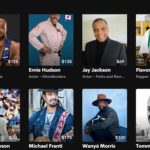“For high school students looking to college and needing guidance identifying the right college major and career path, “My Future Career” web series is the place to get first-hand information on all types of professions equipping you with the right information to identify your future profession. Our dynamic TV host paired with our extensive network of professionals will give you the right exposure to available professions enabling you with the right tools to select your career of choice”.
I’m sure many Africans can identify with this…. when it was time to select a college major, your parents expect you to go with either Medicine, Law, or Engineering. I fell into this category as well, when I was in high school, I was fairly good in math and science, as a result, it was a no brainer that my path was to attend the University of Illinois and major in Electrical Engineering.
My freshman year, I had other African classmates and most of them enrolled in one of the three aforementioned majors. However, by senior year, many of the same students, myself included, had switched majors and graduated in other non-typical African parent “approved” degrees e.g. business administration, public health, communications etc.
The switch in majors was driven by students finding out that they didn’t have much interest in the courses, also truth be told, Medicine, Law and Engineering were usually tougher majors that students didn’t have enough interest to put in the required level of work.
Now the phenomenon of switching majors mid-stream is not limited to African students, according to the US Department of Education, 33% of students enrolled in bachelor’s degree programs change majors. Overall, switching majors adds time and tuition to the already high cost of college. According to the advocacy group Complete College America, the average student takes 4.8 years to earn a bachelor’s degree from university. Changing majors is a huge contributor to this because many students end up taking courses they don’t need, then scurrying to complete the ones they do.

To address this issue, many students enter college undecided on a major with the hope of taking general classes to help figure out what they want to do. Unfortunately, in today’s world, companies expect incoming interns and graduates to have a good knowledge of the subject matter, thus, identifying your major early and aligning your classes puts you ahead of other students when applying for internships and full time jobs.
The issue around undecided career paths opens up a business opportunity for high school students to be educated on different job professions in the real world. We need a platform that details available job professions post college graduation; it should detail what a day in the life is like, job educational requirements, salary information etc. If high school students had this exposure they could identify the jobs that align with their preferred lifestyle early and be better prepared to map out their career path.
Business Opportunity
Problem
Many students enter college with limited information on their preferred career choice due to their limited exposure to real life professions. This issue sometimes leads to additional time spent in college switching majors and sometimes the wrongful selection of a career path that isn’t the right fit.
Solution
A 30-minute YouTube web series titled “My Future Career” where an individual with a dynamic personality visits companies interviewing individuals in an entertaining manner using video to capture what they do, a day in the life at the job, educational requirements, salary expectations, common personality traits that align with the job.
Strategy
- Target Market: High School Students
- Value Proposition: For high school students looking to college and needing guidance identifying the right college major and career path, “My Future Career” web series is the place to get first-hand information on all types of professions equipping you with the right information to identify your future profession. Our dynamic TV host paired with our extensive network of professionals will give you the right exposure to available professions enabling you with the right tools to select your career of choice.
Revenue Model
- Paid subscription by high school systems
- Affiliate marketing by companies offering internships and full-time jobs
- College recruiting advertisement
- Standard YouTube advertisement
- Aggregate viewership data can be sold to companies marketing to the high school demographic
Marketing Tactics
- Product:
- 30-minutes web series
- Price:
- Free for students
- Paid subscription by high school education systems
- Brand
- Education
- Entertainment
- Distribution
- YouTube
- Proprietary platform where schools pay subscription
- Communication
- Target school high school Principals and Heads of Public School systems
- Social media e.g. Snapchat and TikTok
- High school influencers
Future Growth Plan
- Create a blog and newsletter detailing episodes
- Develop an online community of students, college counselors and recruiters
- Partner with a production company such as Disney for enhanced production and distribution
- Possibility to become a Netflix series
- Expand into gig economy jobs such as independent graphic design, website creation, dog walking, influencers, Uber driver etc. The gig economy is growing and high school students are looking to learn more about these “be your own boss” job opportunities.

